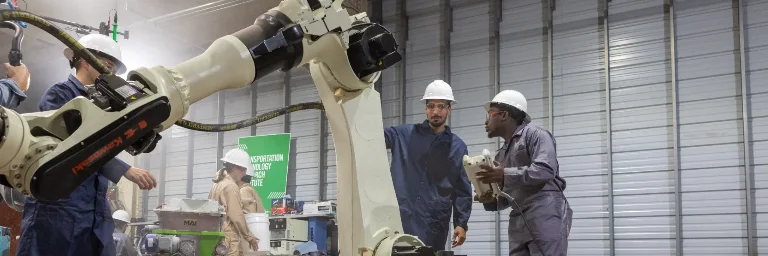
Mechanical Engineering vs. Civil Engineering: What's the Difference?
Every day, we see engineering in action without even realizing it.
Request Information
The cars on the road, the buildings touching the sky, the bridges we cross and the quiet machines working around us are all thanks to engineers. These professionals, whether they're mechanical engineers, civil engineers or another kind, use their skills to make our world better.
In this blog, we're taking a closer look at two types of engineers: mechanical and civil. What do they do? How are they different? Read on to find out more about these important roles in engineering.
What is Mechanical Engineering?
Mechanical engineering involves designing, analyzing and producing mechanical systems and devices. This field integrates principles from physics, mathematics, materials science and computer-aided design to develop innovative solutions across diverse industries.
The interdisciplinary nature of mechanical engineering drives technological innovation and advancements in various industries, such as transportation, where engineers optimize vehicle performance and safety; aerospace, where they design aircraft and spacecraft components for efficiency and reliability; biomedical engineering, where they develop prosthetics and medical devices for improved patient care; and renewable energy, where they design efficient systems for harnessing solar, wind and hydroelectric power.
What is Civil Engineering?
Civil engineering encompasses the management of infrastructure and public works projects involving the planning, design, construction and maintenance of various essential facilities. This field incorporates specialties such as structural engineering, transportation engineering and environmental engineering.
The significance of civil engineering lies in its role in shaping the world's infrastructure through elements like roads, bridges, water supply systems and wastewater treatment plants. By overseeing the development and maintenance of these crucial facilities, civil engineers contribute to economic growth, public safety and environmental sustainability.
What is the Difference Between Mechanical Engineering and Civil Engineering?
Now that we have a clearer understanding of what each engineering field encompasses, let's begin a direct comparison between civil engineering vs. mechanical engineering.
Education
Mechanical engineers typically pursue a bachelor's degree in mechanical engineering or mechanical engineering technologies. These programs cover subjects such as mechanics of materials, heat transfer and control systems. Students learn to apply engineering principles to design and analyze mechanical systems, such as engines, power plants, robots and medical devices.
Pursuing a graduate degree, such as a master's or Ph.D. in Mechanical Engineering, allows students to explore specialized areas like advanced materials, renewable energy systems or mechatronics. These advanced degrees provide research opportunities and equip graduates for leadership roles across various sectors, enhancing their impact and influence in engineering.
Similarly, civil engineers typically begin their careers with a bachelor's degree in Civil Engineering or a related field. These programs include coursework in mathematics, physics, engineering mechanics and construction systems. The curriculum typically combines theoretical learning with practical laboratory work to develop technical proficiency and practical skills necessary for the field.
While a bachelor's degree is sufficient for entry-level positions, civil engineers can also pursue advanced degrees, such as master's in Civil Engineering and Ph.D. in Civil Engineering, to enhance their qualifications for higher-level roles and leadership positions.

Skill Set Requirements
Mechanical and civil engineers have some shared skill requirements but also possess distinct sets of skills tailored to their fields. For example, both need creativity for innovative solutions and effective communication skills to collaborate with stakeholders. They also require strong problem-solving skills to analyze and optimize designs to meet objectives.
However, mechanical engineers also rely on strong mathematical skills, such as calculus and statistics, innovative design and precise troubleshooting of mechanical systems. Moreover, proficiency in mechanical principles allows them to apply fundamental engineering concepts to create advanced devices, fostering technological progress across industries.
In contrast, civil engineers are more focused on analytical abilities to understand design intricacies, including how mechanical systems impact building operations. They also need organizational skills for managing contracts and project details, ensuring smooth progress and resource allocation as well as proficiency in computer-aided design tools to aid in visualizing structures accurately.
Job Responsibilities
The specific duties and responsibilities of mechanical engineers may vary depending on factors such as specialization and project scope; however, they typically encompass:
- Overseeing the entire manufacturing process for designed devices, ensuring quality and efficiency
- Analyzing problems to determine how mechanical devices can address specific challenges
- Utilizing computer-aided design to develop or modify designs as needed
- Investigating equipment failures and diagnosing faults to recommend appropriate solutions
- Developing and testing prototypes, analyzing results and modifying designs/systems as necessary
On the other hand, civil engineers' responsibilities usually include the following:
- Designing infrastructure such as roads, bridges and buildings with a focus on functionality and safety
- Supervising construction activities to ensure adherence to project specifications and timelines
- Collaborating with architects, urban planners and other professionals to develop comprehensive project plans
- Assessing the environmental impact of projects and proposing sustainable solutions
- Providing technical expertise and support to project teams throughout the construction process
Work Environment
The work environment of engineers, whether in civil or mechanical fields, spans from traditional office settings to dynamic field sites, reflecting the diversity and adaptability required in their roles. Here's a closer look at what these environments entail for both civil and mechanical engineers.
Civil Engineers
Civil engineers have a versatile work environment that divides between offices and field sites.
- Office work: Their office responsibilities include drafting project plans, conducting research and communicating with clients and team members.
- Fieldwork: When on-site, they oversee construction activities, inspect infrastructure projects and ensure compliance with design specifications and safety standards. This includes frequent visits to construction sites, conducting surveys and collaborating with contractors and professionals on-site.
Mechanical Engineers
Mechanical engineers also enjoy a diverse work setting, including offices, laboratories and field sites.
- Office and laboratory work: Inside offices, they're tasked with designing mechanical systems and developing simulations. Laboratory responsibilities focus on experiments, testing prototypes and data analysis to improve mechanical device performance.
- Fieldwork: Their field duties involve overseeing the installation of equipment, troubleshooting and ensuring systems operate effectively in real-world conditions. This might involve visits to manufacturing facilities, site inspections and working closely with technicians on-site.
Job Outlook and Salary
The field of mechanical engineering is projected to experience a growth rate of 10% from 2022 to 2032, resulting in an average of 19,200 job openings annually over the decade. On the other hand, the employment of civil engineers is expected to grow by 5% during the same period, with a slightly higher average of 21,200 job openings per year.
In terms of salary, mechanical engineers tend to have a higher median annual income compared to civil engineers. The median annual wage for mechanical engineers is $96,310, whereas the salary of civil engineers is $89,940 per year.

Mechanical Engineering vs. Civil Engineering: Which One is Right for You?
Deciding whether mechanical or civil engineering is right for you comes down to your personal interests, strengths and career goals.
Discover your Passion
Think about what captures your interest. If you're drawn to designing and improving machinery, vehicles and products, mechanical engineering might be your calling. If you're inspired by creating and maintaining infrastructure like bridges, roads and buildings, then civil engineering could be a better fit. Your passion for certain projects can help guide your choice.
Evaluate your Strengths
Consider the skills you excel in. Mechanical engineering requires a good grasp of math and a knack for solving complex problems creatively. Civil engineering, on the other hand, demands strong analytical skills and a thorough understanding of structural principles. Matching your skills to the field can lead you to the right path.
Seek Advice
Talking to people working in these fields can provide valuable insights. Mentors, professors and career counselors can offer perspectives on each profession's challenges and rewards. Networking with professionals can also shed light on your decision.
Look to the Future
Finally, think about your long-term goals. Each field offers different opportunities for advancement and specialization. Choose the one that aligns with your aspirations and promises a fulfilling career.
Conclusion
Mechanical and civil engineers, while focusing on distinct disciplines, share a unified purpose: to innovate, solve complex challenges and improve our world through their engineering efforts. Whether your interest lies in devising next-generation machinery or constructing the infrastructure of the future, both paths offer enriching careers and the opportunity for meaningful contributions.
If you're poised to further explore your potential in these exciting fields, the University of North Dakota has the resources to guide you. Delve into the specifics and see how your aspirations align with our offerings by exploring the Civil Engineering or Mechanical Engineering program at UND.
Embarking on this educational journey is a step toward not only shaping your professional future but also contributing to the enduring legacy of engineering innovation and societal progress.
FAQs
Yes, mechanical and civil engineers often collaborate on projects, especially those involving infrastructure development or building construction. Their combined expertise ensures comprehensive solutions that meet both structural and mechanical requirements.
Civil engineering typically offers more opportunities for fieldwork, as they frequently visit construction sites to oversee projects, conduct inspections and ensure compliance with design specifications and safety standards.
Yes, both mechanical engineers and civil engineers typically need to be licensed to practice professionally. Licensure requirements vary by location but generally involve completing an accredited engineering program, gaining relevant work experience and passing the licensure exam.